
Scroll to review Summary
Download PDF
Outlook 2023
Executive Summary Presented by the
Clearwater Capital Investment Policy Committee

CCP Wealth Home
Each year the Investment Policy team at Clearwater Capital does a deep dive into the economic research and market analysis produced by a wide range of prominent economists and academic scholars.
Our goal is to develop an intelligent framework that will inform and guide our investment strategies. We do the hard work of establishing our own interpretations and we develop an economic thesis that is maintained throughout the year.
Our Outlook 2023 report provides the full details of our expectations going forward. This research initiative supports a better understanding of the primary forces affecting the financial system, while enhancing our ability to keep critical decisions close to our clients.
As the facts change, so will our perspectives and strategies.
Chief Executive Officer
Chief Investment Strategist
Clearwater Capital Partners
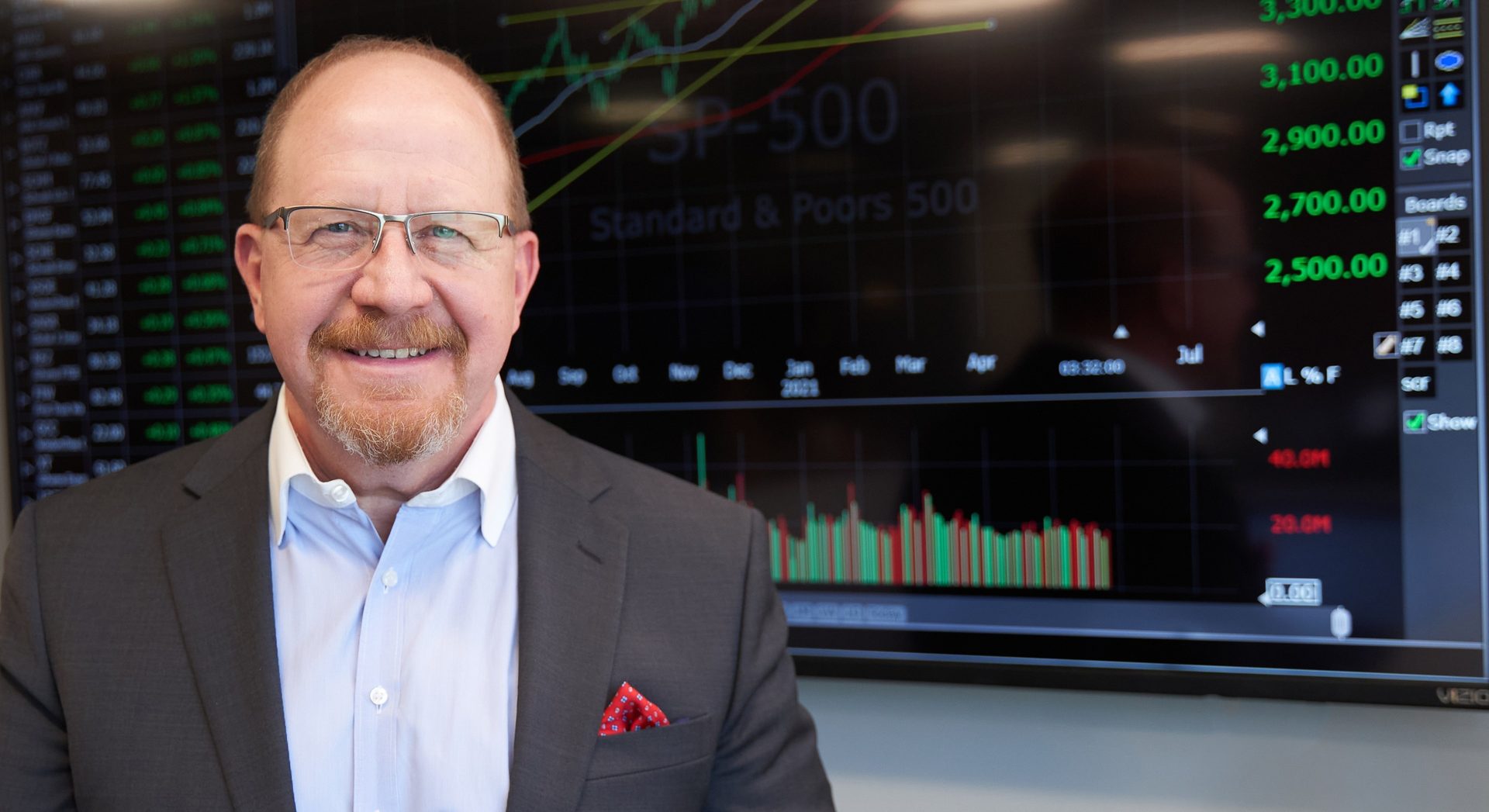
John Chapman
The macro headwinds in 2022 were very real and generally hostile. We had the highest inflation in 40 years, with the most aggressive monetary tightening campaign in decades. We also had the war in Ukraine, political upheaval, and the collapse of the crypto ecosystem, among many other problems.
2022 gave Wall Street its worst year since 2008 with the S&P 500 finishing 2022 down nearly 20%. Both stocks and bonds simultaneously sold off as investor sentiment fell to levels not seen since the Global Financial Crisis in 2008.
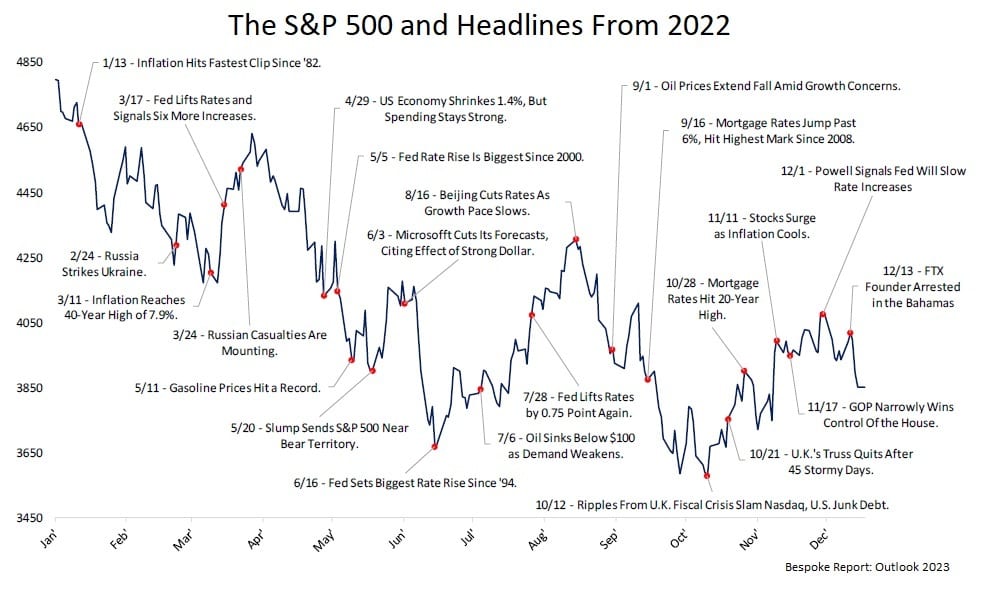
2022 Retrospective
A New Market Regime
The economic environment over the past 14 years has not really changed much when compared to the past 40 years. However, the global response to the COVID pandemic created momentous distortions in the global economy and we believe a “new market regime” may be forming.
Clearwater Capital Partners is focused on three big changes that materialized in 2022.
Any one of these seismic shifts could be meaningful for the economy and capital markets. Taken together they represent a noteworthy transformation of the environment for businesses, consumers, and investors. This regime change will require everyone to adjust strategic thinking.
Leading Economic Indicators (LEI)
The LEI fell deeper into negative territory in December falling 1.0 percent and was weaker than more than 92% of all prior readings since 1960.
A cresting pattern in the LEI, followed by a downturn, has historically heralded recessions, which appear as grey shaded vertical bars on graph to the right.
Economic Conditions for 2023
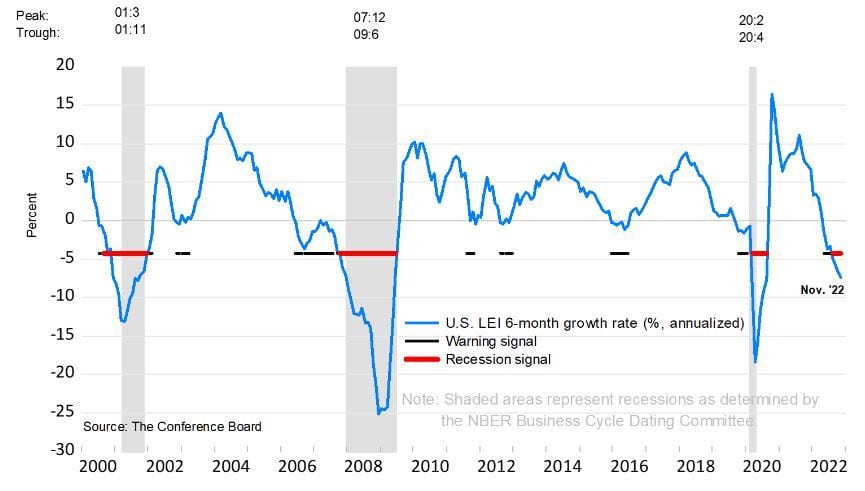
The new year begins with a broad deterioration of economic conditions. The data has been weak in recent months and appears to be getting weaker. Monetary policy unquestionably works with a lag and the full impact of tighter financial conditions will take months to fully work its way through different sectors of the economy.
U.S Inflation (CPI)
The consumer price index in the U.S. increased 6.5% in December marking the lowest inflation rate since October of 2021.
While there is strong data indicating that goods inflation has peaked, the rate remains well above the Fed’s target of 2.0%.
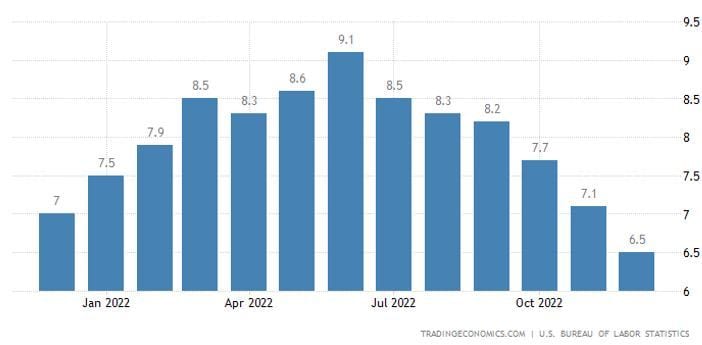
While we do expect circumstances will turn more favorable later in the year, the current trend is one of decelerating economic activity and fading, but still high, inflation. It is logical to assume the near-term environment may be volatile.
Valuations
Corporate earnings are expected to have increased by only about 4% in 2022. This would be well below the 5-year average earnings growth rate of +14% and below the 10-year average earnings growth rate of nearly 9%. As the new year begins, estimates are falling, and analysts are projecting earnings growth of just about 3% in 2023.
Looking to 2023 and consensus estimates for S&P 500 earnings, the forward P/E is just under 17X. This valuation level is slightly below the 5-year average but above the 10-year average. Equities appear to be reasonably priced at current levels, meaning the market is neither “expensive” nor “cheap” relative to current earnings expectations.
Market Conditions for 2023
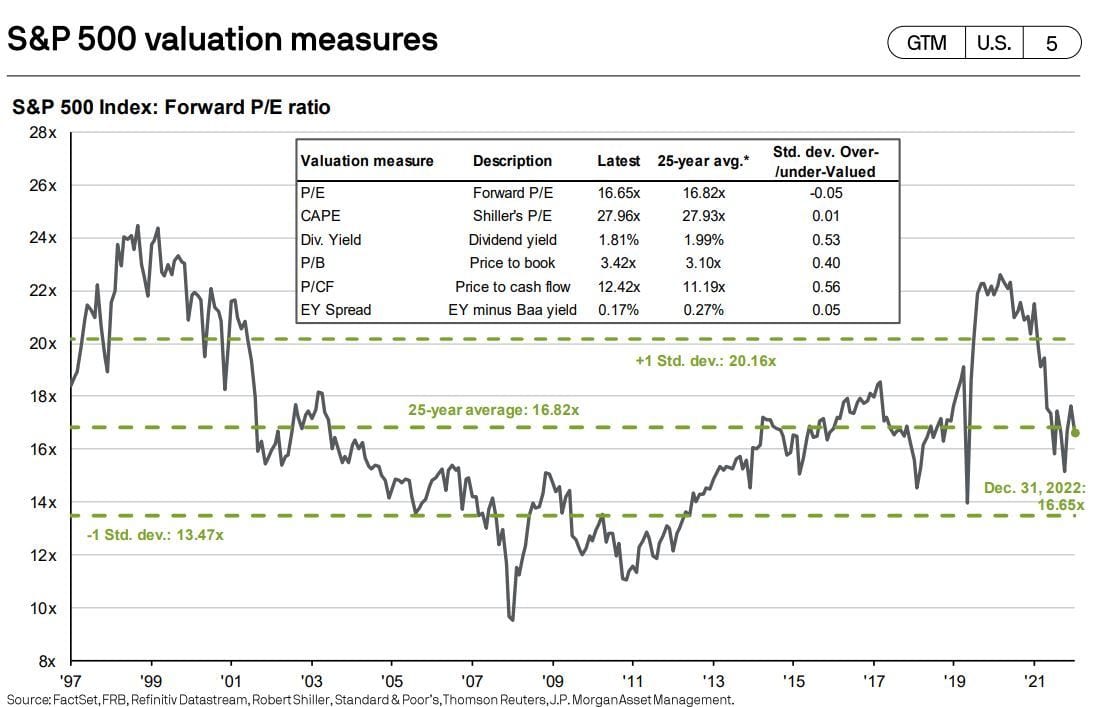
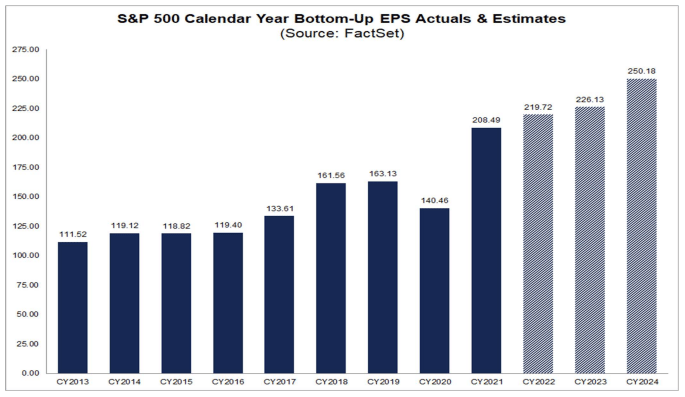
Earnings
With weakening economic activity and bearish investor sentiment, the equity markets begin 2023 in an uncertain position. Both corporate profitability and equity valuations will likely be under pressure for the next several quarters.
A protracted recession is the key risk to equity markets in 2023. Any downturn running deeper or longer than the mild recession we foresee would likely take both earnings and valuations much lower.
The long-term confidence we have in our thematic strategies is predicated on the belief that companies investing heavily in innovation have the potential to produce profitable operating models and exponential growth opportunities over the long-term.
These thematic investments performed exceptionally well in 2020, consolidated those gains in 2021, and sold off sharply in 2022.
While thematic strategies, built on compelling innovation, have fallen out of favor, we believe these strategies will be the prime beneficiaries when equity markets recover.
Thematic Strategies in Growth Sectors
- Cloud Computing
- CleanTech and Clean Water
- FinTech, Blockchain
- Quantum Computing
We are purposefully building careful exposure to innovation and new technologies that we believe could experience exponential growth in the years ahead.
Recessions are a natural and necessary means of clearing out imbalances in the economy and are simply part of the normal economic cycle. This said, they can create a lot of stress for investors. Over the past 70 years, recessions have produced an average drawdown of 30.7% for the S&P 500.
Understanding Recessions and Bear Markets
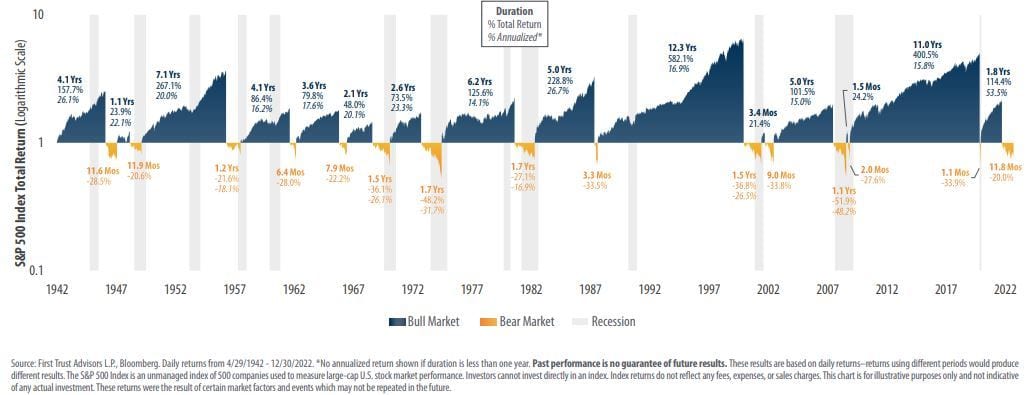
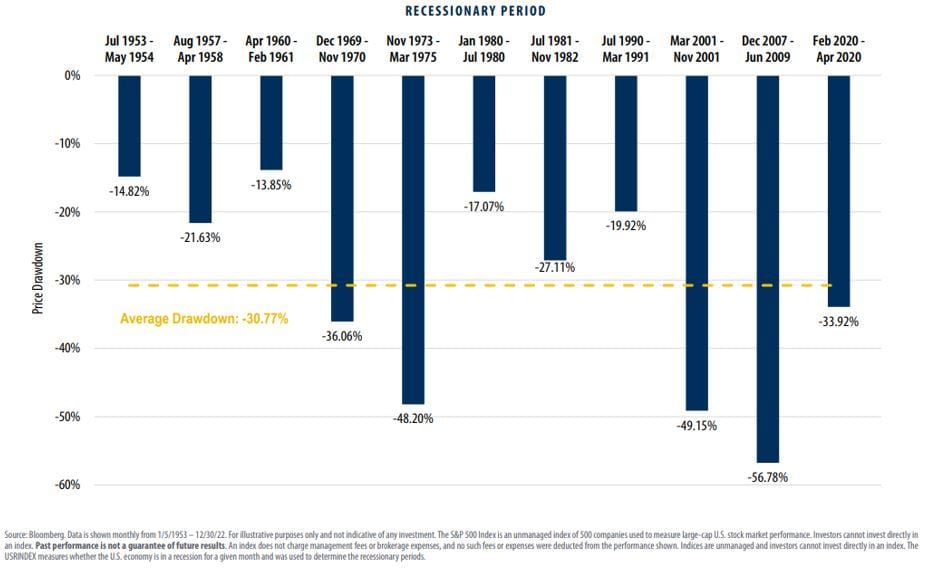
Bear market cycles, as painful as they may be, typically last about 11 months with an average cumulative loss of 31% and pale in comparison to the power of the average bull market cycle that follows. Bull market periods have typically lasted almost 4.4 years with an average cumulative total return of 155.7%.
We believe a mild recession will hit in 2023. With economic leading indicators now falling, the yield curve seeing its deepest inversion since 1981, and earnings estimates expected to come down in early 2023, a recession would appear to be inevitable.
The highest priority for Clearwater Capital Partners over the next 12 to 18 months will be to prepare our clients to understand this downturn and emerge stronger than ever. This will involve the discipline to avoid classic mistakes and being soundly positioned to prosper when good times return.
Clearwater Capital’s Base Case For 2023
Following the most aggressive Fed hiking cycle in 40 years, the Fed remains firmly entrenched in a tighter monetary policy stance. We expect inflationary pressure will continue to moderate in 2023 giving the Fed the opportunity to pause with the fed funds rate just above 5%.
- Connected to the tighter financial conditions, our base case for 2023 sees the U.S. economy decelerating further with a mild recession beginning by mid-year. In turn, corporate profits can be expected to decline along with a slump in economic activity.
- We believe the October 2022 lows in equity prices will be retested in the first half of the year. If the October lows don’t hold in 2023, history would suggest some significant further downside is possible with the S&P 500 could trade as low as 3,300.
Conclusion
- The easy money policies and the fiscal stimulus following the COVID crisis provided a major tailwind for equities. Now, these factors have been unwinding in a significant way and tighter financial conditions represent considerable headwinds. The risk of a policy mistake wherein the Fed tightens too much will remain an important driver of the capital markets in the months ahead.
- While no one knows precisely when inflation will have receded enough for the Fed to conclude this historic tightening cycle, we believe the data will encourage the Fed to “pause” sometime in the first half of the year. In turn, markets will have the opportunity shift their focus to recovery and anticipate the growth we believe is likely in 2024.
- We believe a potentially difficult environment over the next several months will set up a period of stabilization followed by the potential birth of a new bull market. In this scenario, investors must remember that the point of maximum pessimism is also the point of maximum opportunity.
We believe a potentially difficult environment over the next several months will set up a period of stabilization followed by the potential birth of a new bull market. In this scenario, investors must remember that the point of maximum pessimism is also the point of maximum opportunity.
Most things that could have gone wrong for investors in 2022 did and as 2023 begins we find ourselves at a pivotal moment for our economy.
Clearly, our base case delivers a rather cautious outlook for the first half of 2023. This said, we must resist the trap of becoming too bearish as the markets find the bottom to this cycle. Eventually the tide will turn, and we must be positioned to participate in the early rallies of a new bull market.
Proper wealth management demands a sound framework for decision-making. It is about planning over long horizons of time and not becoming distracted by the inevitable twists and turns along the way.
While creating and growing wealth is an exciting challenge, we recognize that the road forward will not be easy, comfortable, or quick. The journey will be asymmetrical, volatile, and incredibly frustrating at times. Volatility and market drawdowns are often painful for even the most seasoned investor.
We take nothing for granted, and we strive to construct judgments that are supported by data and logic. Given the diligence with which we approach this challenge, we have genuine confidence the conclusions presented in this year’s Outlook 2023 report will again prove valuable.
Thank you for taking the time to review our perspectives and forecasts. We are deeply grateful for the many relationships of trust and commitment we share with our clients.
Clearwater Capital Partners
January 2023
Thank You

The opinions presented are those of Clearwater Capital Partners and John Chapman, Chief Executive Officer and Chief Investment Officer, as of January 2023 and may change, without notice, as subsequent economic and market conditions vary.
This material is presented as opinion and commentary. It is not intended to be relied upon as a forecast, research or investment advice, and is not a recommendation, offer or solicitation to buy or sell any securities or to adopt any investment strategy. It is strictly intended for educational purposes only.
The information and opinions contained in this material are derived from proprietary and nonproprietary sources deemed by Clearwater Capital Partners to be reliable, are not necessarily all inclusive and are not guaranteed as to accuracy. Past performance does not guarantee future results. There is no guarantee that any forecasts made will come to pass. Reliance upon information in this material is at the sole discretion of the reader. No investment or investment strategy is risk free.
International investing involves additional risks, including risks related to foreign currency, limited liquidity, less government regulation and the possibility of substantial volatility due to adverse political, economic or other developments.
The two main risks related to fixed-income investing are interest rate risk and credit risk. Typically, when interest rates rise, there is a corresponding decline in the market value of bonds. Credit risk refers to the possibility that the issuer of the bond will not be able to make principal and interest payments.
Index performance is referenced for illustrative purposes only. You cannot invest directly in an index. The Dow Jones Industrial Average is owned by S&P Global, the S&P 500 is a registered trademark of The McGraw-Hill Companies, and The Russell 3,000 Index is maintained by FTSE Russell. Because of their narrow focus, sector investing will be subject to greater volatility than investing more broadly across many sectors and companies.
High yield/junk bonds (grade BB or below) are not investment grade securities, and are subject to higher interest rate, credit, and liquidity risks than those graded BBB and above. They generally should be part of a diversified portfolio for sophisticated investors.
Municipal bonds are subject to availability and change in price. They are subject to market and interest rate risk if sold prior to maturity. Bond values will decline as interest rates rise. Interest income may be subject to the alternative minimum tax. Municipal bonds are federally tax-free but other state and local taxes may apply.
Government bonds and Treasury bills are guaranteed by the US government as to the timely payment of principal and interest and, if held to maturity, offer a fixed rate of return and fixed principal value.
The payment of dividends is not guaranteed. Companies may reduce or eliminate the payment of dividends at any given time.
Nothing contained herein is offered as tax advice. Please consult qualified professionals with any tax planning needs or tax questions you may have.
Investment Advice offered through Clearwater Capital Partners a registered Investment Advisor. Please consult with a qualified investment professional before investing.